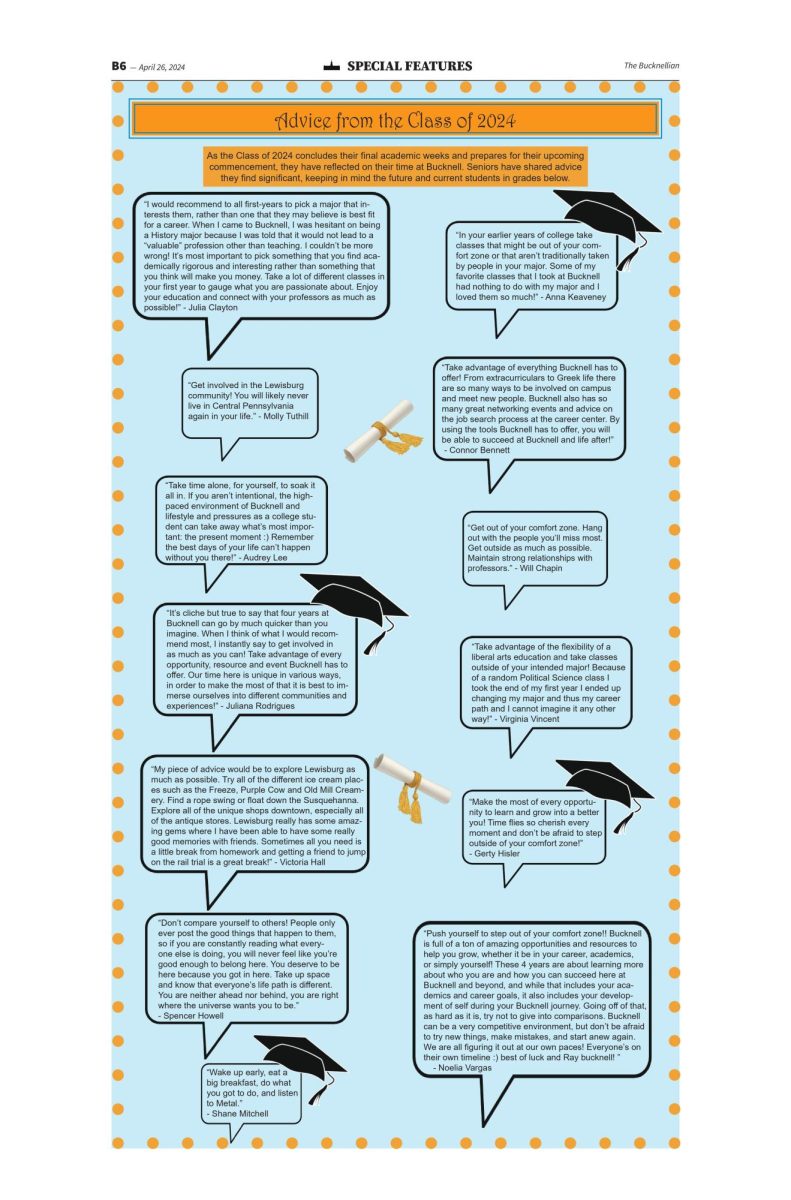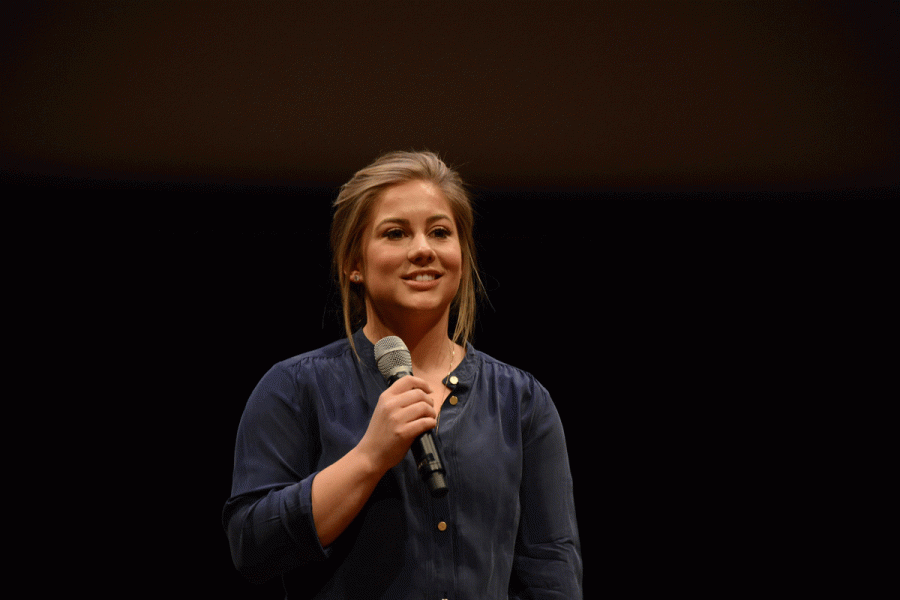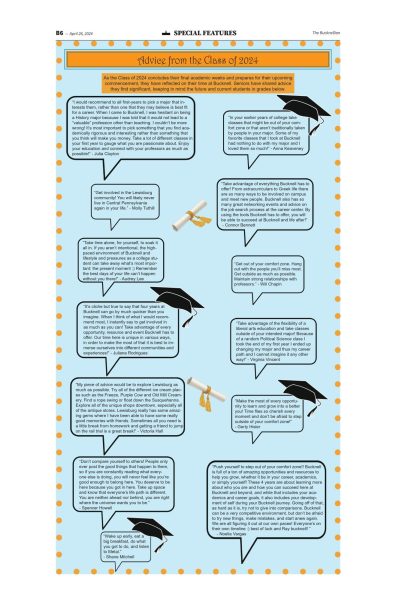Shawn Johnson on ‘sticking it’ in life
March 30, 2017
“You are supposed to be different, you are supposed to be unique, you are supposed to be you.”
These words resonated over the years and throughout various life stages for Olympic gold-medalist gymnast Shawn Johnson, who spoke in the Weis Center for the Performing Arts on March 23. Johnson was brought to the University by the Student Lectureship Committee and was introduced by Student Lectureship Chair Alyssa Benjamin ’17.
“Shawn truly loves big and lives big,” Benjamin said before ceding the stage to the 4’9” and 25-year-old Johnson.
Next, a commemorative video played, detailing Johnson’s achievements starting with her gymnastics endeavors as a young child to her incredible trajectory as an Olympic athlete to her post-retirement appearance on “Dancing with the Stars” and talk shows with Oprah Winfrey, Ellen DeGeneres, and Jimmy Kimmel.
Johnson joins a roster of talented individuals brought to campus by the committee, including Bill Nye (the Science Guy), actor and political activist Kal Penn, and actor RJ Mitte. The committee works to bring speakers to campus who provide unique experiences and perspectives, according to Benjamin. Johnson is not the first American Olympic gymnast to grace the Weis Center’s stage; 2012 all-around Olympic gold-medalist Gabby Douglas also spoke at the University in March 2013. This year, the committee also considered Mayim Bialik, Sheryl Sandberg, Jay Wright, Mark Ruffalo, Buzz Aldrin, and Sally Yates.
Johnson opened her talk with a humble recognition of the video.
“It’s always really awkward to watch that video from backstage,” Johnson said.
She described her start in gymnastics at the age of three as the solution to a surplus of energy. Gymnastics was never the only sport she was interested in, but it was the one she stuck with and began to master, eventually making the U.S. National Team at age 13. Johnson never dreamed of being an Olympic gymnast—she had always dreamed of being an orthopedic surgeon and attending an Ivy League college.
But dreams change and priorities shift, and Johnson was quickly catapulted to the pinnacle of international gymnastics. When she competed in the 2008 Olympics, she was the reigning World Champion. Her silver medal in the all-around competition at the Olympics became the beginning of the end for her career in gymnastics, largely due to the effect of external opinions and judgments of what that meant for Johnson; for many outside of her inner circle of coaches, friends, and family, the silver medal win was perceived as a loss of the gold medal.
“I found myself relating to her experiences even though I have never done something on an Olympic level,” Benjamin said. “[Johnson] talked a lot about how it felt when everyone asked her what it was like to lose. I think a lot of college students can relate to that.”
Johnson focused largely on themes and lessons that were universally applicable, from self-image to bullying to wanting to fit in, but the major anecdote that guided her overarching message centered around the 2008 Olympics where she had come into the competition as “America’s Sweetheart” and the favorable competitor to sports commentators, Las Vegas bettors, and corporate branding contracts.
Johnson’s best friend, toughest competitor, and American teammate Nastia Liukin took the gold in the all-around, which was surprising to many considering 16-year old Johnson’s status as the “It Girl,” and the gymnast to beat. Johnson was initially thrilled with both her win and Liukin’s win, only to be thrown into despair when a “corporate bigwig” had presented her with the silver medal on the Olympic podium along with the words “I’m sorry.”
The press conference that followed the medal ceremony only further drove home the point that the world was going to assume that Johnson had failed because she hadn’t lived up to their expectations of a gold medal in the all-around.
Those two words and the subsequent questions from the press of “How does it feel to lose?” ate away at Johnson’s self-confidence and elation following what is incredible and impossible for many—a silver medal at the Olympics. In the years following, Johnson intended to compete at the subsequent 2012 Olympics, but ultimately hit a breaking point a week before the Olympic trials and issued a worldwide press release explaining her immediate retirement from gymnastics.
“From that moment forward, I felt weightless. I was the happiest person in the world. I was just me again,” Johnson said. “Things just worked out for the better… and all because I was doing things for me again.”
Johnson’s gymnastics career up until that point had been based on paths that other people had chosen or identified as the best one for her, she explained.
“When you try to follow a path or live up to expectations or do the things you think you should, things just don’t work out,” she said.
In the year following, Johnson leaned on her inner circle to regain a sense of who she was, a journey that ultimately showed her that retiring from gymnastics was how she would do something entirely for herself, rather than for anyone else.
Incoming Student Lectureship Committee Chair Tehani Gunaratna ’18 felt that Johnson’s talk had a widely applicable message. “As a university with nearly 950 student athletes, [the committee] knew that many of them could relate to the intensity and dedication Shawn had to practice in her sport starting from a young age.”
Johnson spoke with The Bucknellian prior to the event, and the interview was broadcast on WVBU, along her reading the call sign of the station: “Hi, this is Shawn Johnson, and you’re listening to WVBU.” She also had dinner with members of the Student Lectureship Committee, during which Johnson and the committee discussed the various sports besides gymnastics that Johnson had played as a child and Johnson’s time on “Dancing with the Stars.”
“The dinner is a great way to get to know the speaker that we have worked on promoting the entire semester,” Benjamin said.
Having retired at the age of 19 after a white-hot Olympic career, Johnson found herself able to throw herself into gymnastics in a different way, providing support for her fellow American teammates, coaching clinics for young gymnasts, and starting a digital marketing platform business with her now-husband, who plays in the National Football League.
Johnson’s talk concluded with a lengthy question-and-answer session, in which her message of self-worth and pursuing success for one’s own self-satisfaction prevailed. Many audience members were not only members of the University community, but also young gymnasts from the surrounding Lewisburg, Pa. area. Johnson reassured young gymnasts that following your own path doesn’t necessarily equal Olympic dreams; your own path could mean being an orthopedic surgeon, or an artist, or a writer—as long as it’s your own.
























